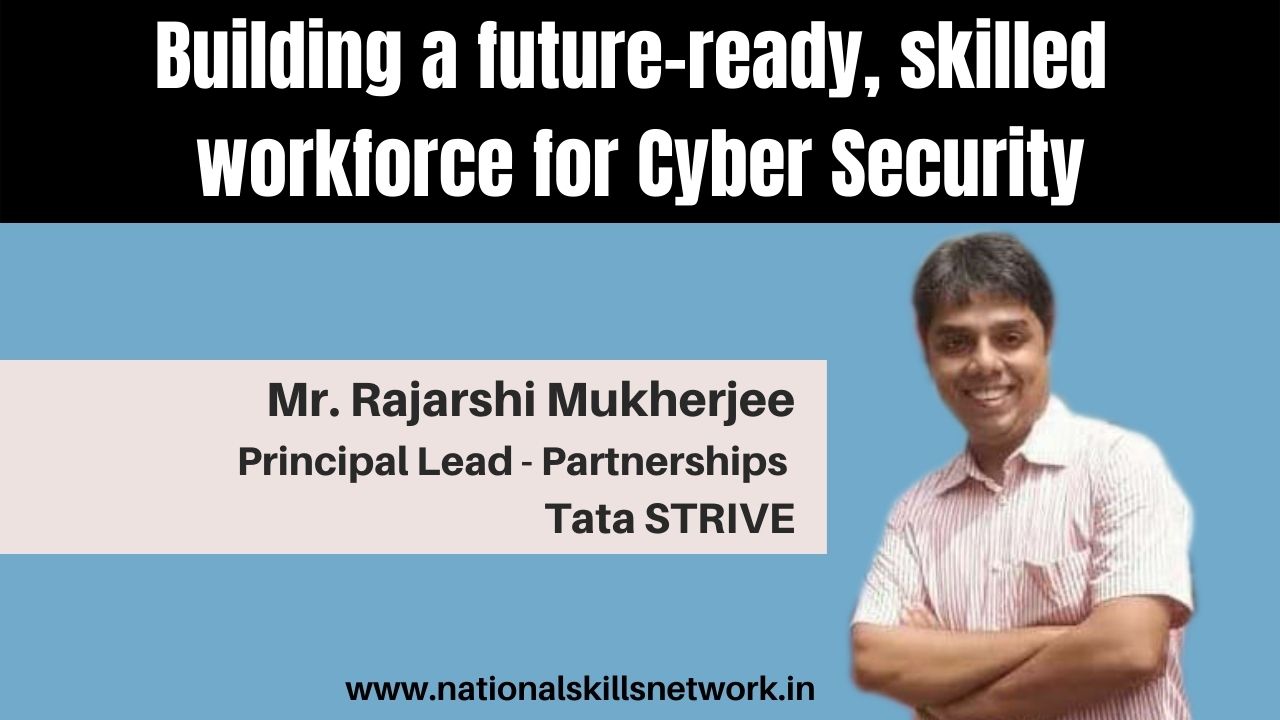
Over the past few years, there has been an increased use of digital solutions in various fields. This has also increased the scope for cyber attacks in the country. Every few hours a new malware is created and is intended at harming individuals, and organisations and leads to damage of some extent.
Learn more about Tata STRIVE’s courses and their initiatives in skill development – https://nationalskillsnetwork.in/tata-strive/
Cyber attacks have called for an increased demand for a skilled workforce in Cyber Security. Even though the job size is growing, salaries are attractive, the skill gap between the demand and supply of skilled professionals in Cyber Security is taking time to fill up.
We interacted with Mr. Rajarshi Mukherjee, Principal Lead – Tata STRIVE to learn the scope of Cyber Security in India and various opportunities in this field, along with a unique training programme on Cyber Security developed by Tata STRIVE.
Below are a few excerpts from our conversation. You can watch the full video interview on our YouTube channel.
Q: What is the importance of Cyber Security, especially in the post-COVID-19 scenario?
A: Some of the initiatives of the government like demonetization and Digital India have provided a push to digital transactions even before the pandemic. The sudden outbreak of COVID-19 further accentuated the adoption of digital solutions for conducting day-to-day activities. Today, even a roadside vendor is using digital modes of payment. All of this has made individuals, organisations, and governments vulnerable to cyber attacks.
Ensuring security from cyber attacks has become important and the demand for Cyber Security professionals is at an all-time high. As per the PwC study, instances of cyber attacks in Indian organizations increased by 17% in 2019 compared to the previous year. All these factors have led to the demand for resources trained in Cyber Security.
According to a report by TeamLease, by 2025, there will be a requirement of approximately 1.5 million new entrants in the Cyber Security space in India. India currently has a few resources in this field.
According to NASSCOM, the number of trained people is few and the growth has not been great. So, the organisations have become desperate and started giving huge premiums to the employees to secure their systems.
Q: Please tell us about Tata STRIVE’s training programme on Cyber Security and how is it offered with partners like Microsoft?
A: We, at Tata STRIVE, realised that we have an important role to play in preparing the youth for digital space. That is when we thought getting into Cyber Security was crucial.
Tata STRIVE’s Cyber Security programme is based upon an existing programme by Microsoft and the Data Security Council of India (DSCI) called ‘Cyber Shikshaa’ which started around two and a half years back.
Tata STRIVE’s training programme has been later renamed ‘Cyber Shikshaa Plus’ and has been developed in partnership with Microsoft, DSCI, and Tata Communications. They helped us not just in funding but in multiple other ways as well.
Tata STRIVE has started different initiatives in terms of creating standardised content that can be delivered by any faculty member. We also integrated our soft skill module for youth development in the content to make students workplace-ready.
Tata STRIVE’s long-term IT partner, Tata Consultancy Services (TCS) has been conducting regular guest lectures, providing industry insights, and has been recruiting our students.

Q: How does the Cyber Security programme stand unique amongst similar programmes?
A: This is a women-centred course. It is focused on women who come from a disadvantaged background and with an annual income below seven lakhs. In this programme, we equip students with basic to advanced training.
Our partner Microsoft believed that the course should be focused on women. According to an article published in the Times of India (TOI), women’s participation in Cyber Security is extremely poor today. So, we attempt to change this scenario and make Cyber Shikshaa Plus play an important role in terms of ensuring that women can also become a part of the Cyber Security space and build a skilled workforce for Cyber Security.
Also read: Scaling skill development through blended learning – https://nationalskillsnetwork.in/scaling-skill-development-through-blended-learning/
Q: What are some of the job roles that trainees get into in the field of Cyber Security?
A: Initially, every student gets into an entry-level job role and over a period of time moves to higher levels. Some of the career opportunities in Cyber Security are –
- Security Engineers – who look at the threats and vulnerabilities to build networks
- Security Architects – who would secure the entire network of the organisation
- Incident Reporters – who monitor the company’s networks and fix vulnerabilities
- Digital Forensic Investigators – who can work with the government and police
- Ethical Hacker – who try to ensure the factors and reasons for the attacks
Q: Is there any success story you would like to share with our audience?
A: Yes. One of the inspiring stories I have come across is of our alumni, Nikita Ghule. She completed her Engineering and wanted to build a career in the digital space. But when she entered the market, she was clueless on how to build a career in this space and in Cyber Security in particular.
That is when she heard about the Cyber Shikshaa Plus programme at Tata STRIVE and decided to join the course. Now she is successfully placed in TCS with a handsome package.
If you wish to get in touch with Tata STRIVE, you may contact them by visiting https://tatastrive.com/Contact.aspx or by writing to them at STRIVE@tatasustainability.com













